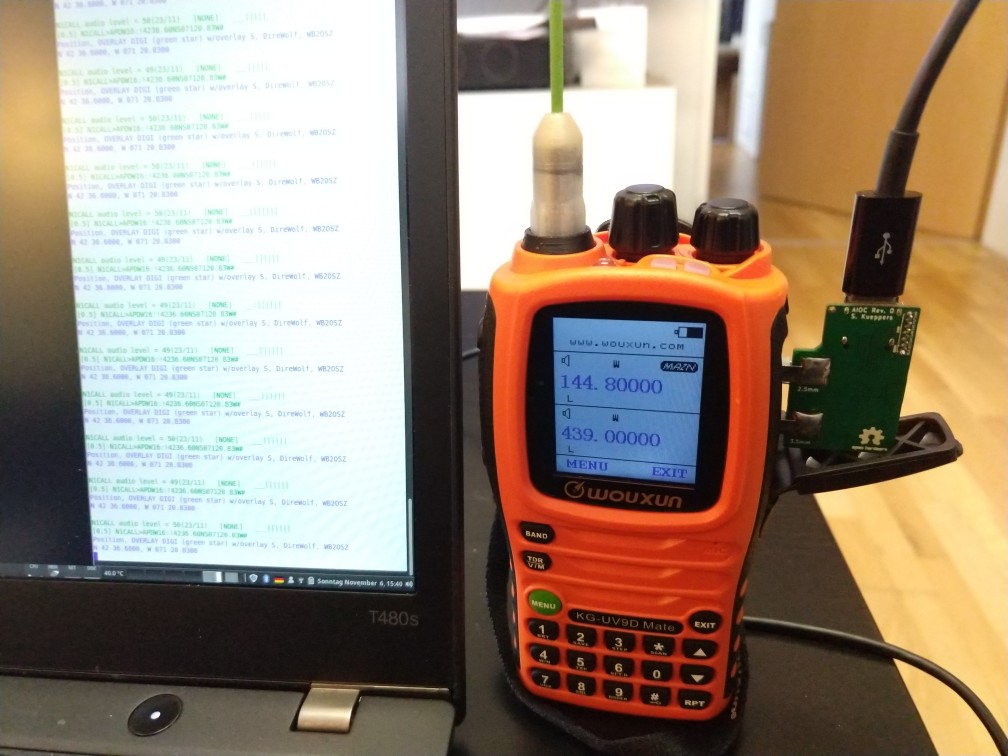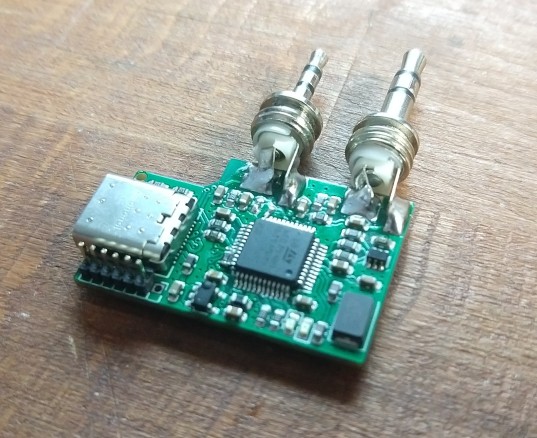This is the Ham Radio All-in-one-Cable.
The AIOC is a small adapter with a USB-C connector that enumerates itself as a sound-card (e.g. for APRS purposes) and a virtual tty ("COM Port") for programming and asserting the PTT (Push-To-Talk).
- Digital mode interface (similar to digirig)
- Programming Cable Function via virtual Serial Port
- Compact form-factor (DIY molded enclosure TBD)
- Based on easy-to-hack STM32F302 with internal ADC/DAC (Programmable via USB bootloader using DFU)
- Tested with Wouxun UV-9D Mate and Baofeng UV-5R
- Works with Direwolf (Notes on APRSdroid below)
- Enclosure (DIY using 3D-Printed mold and Resin)
- Maybe integrate a TNC Modem with KISS interface? (I am not sure if that is worth the effort)
- Maybe change the USB-C connector type due to sporadic connection issues with JLCPCB's SMT reflow process
- Go to JLCPCB.com and upload the GERBER-k1-aioc.zip package (under
kicad/k1-aioc/jlcpcb)- Select PCB Thickness 1.2mm (that is what I recommend with the TRS connectors I used)
- You may want to select LeadFree HASL
- Select Silkscreen/Soldermask color to your liking
- Check "PCB Assembly"
- PCBA Type "Economic"
- Assembly Side "Top Side"
- Tooling Holes "Added by Customer"
- Press Confirm
- Click "Add BOM File" and upload
BOM-k1-aioc.csv - Click "Add CPL File" and upload
POS-k1-aioc.csv - Press Next
- Look Through components, see if something is missing or problematic and press Next
- Check everything looks good and Save to Cart
- You need to use Monacor PG-204P and PG-203P or compatible TRS connectors (2 solder lugs and a big tab for the sleeve connection)
- Cut the 2.5mm and 3.5mm TRS sleeve tab where the hole is located
- Put both TRS connectors into the solder guide (or a cheap HT that you don't mind potentially damaging). Make sure, that they are seated all the way in
- Solder sleeve tab on the back side for both TRS connectors first
- Turn around PCB and solder remaining solder lugs
- Short outermost pins on the programming header. This will set the device into bootloader mode in the next step.
- Connect USB-C cable to the AIOC PCB
- Use a tool like
dfu-utilto program the Release Binary like this:Note that adfu-util -a 0 -s 0x08000000 -D aioc-fw.binlibusbdriver is required for this. On Windows there are additional steps required as shown here (DFuSe Utility and dfu-util). On other operating systems (e.g. Linux, MacOS), this just works ™ (provided libusb is installed on your system). - Remove short from first step, unplug and replug the device, it should now enumerate as the AIOC device
- Follow the regular setup guide with direwolf to determine the correct audio device to use
- Configure the device as follows
[...] ADEVICE plughw:<x>,0 ARATE 48000 [...] PTT /dev/ttyACM0 RTS -DTR [...]
- Start CHIRP
- Select Radio->Download from Radio
- Select the new COM/ttyACM port and start
Although theoretically not an issue, currently APRSdroid is not supported due to the following two issues:
- According to ge0rg/aprsdroid#156 the sample-rate is fixed to 22050 Hz. Currently, only 48000 Hz is supported by the AIOC (and 24000 Hz or 12000 Hz would be possible to implement). However it should be possible to also support 22050 Hz although with an approximate frequency error of 90ppm (which however should be fine for APRS)
- Currently APRSdroid does not support any PTT control via a serial interface. See ge0rg/aprsdroid#324 However my previous experience is, that the Android kernel brings support for ttyACM devices (which is perfect) so implementing this feature should be no problem.

